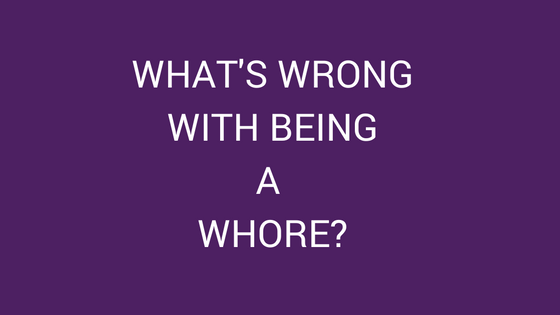The question was raised recently during a conference that focused on HIV in the U.S. and how we can increase awareness of the use of Pre-Exposure Prophylaxis (PrEP) that prevents HIV infection in HIV-negative people. At the close of the conference, one of the speakers asked the audience, “What’s wrong with being a whore?” What I found most shocking wasn’t the question, but the way the crowd erupted in thunderous applause in response.
It may appear the speaker was commanding the audience to embrace the word “whore.” To remove the stigma of loose and risky sexual behavior by women and men with little respect for their bodies and low self-esteem. Perhaps the crowd was supporting this theory. But this question leaves me unsettled. As a young Black woman, there is something unnerving about another young person, in this case a young Black man, asking, “What’s wrong with being a whore?” at a conference specifically designed to address HIV prevention efforts.
Using words like whore and “slut” are problematic because Black women have a unique and complex history of being stereotyped as hypersexual, lewd and “always ready and willing.” HIV infection among Black women is a complex mix of economic, social, cultural, biological, environmental and behavioral factors. Terms like whore or “slut” only distract from the core issue that Black women represent a disproportionate number of HIV/AIDS cases, accounting for 64 percent of all new HIV infections among women. It is estimated that one 1 in 32 Black women will be diagnosed with HIV in her lifetime. Currently, HIV- related illness is one of the leading causes of death among Black women ages 25-34. In short, high HIV infection rates among Black women continue to be a serious problem. Should we really be promoting high-risk sexual behavior at a time where we are seeing such a disparity?
So, I need to ask the question: what is wrong with being a whore? High-risk sexual behavior with potentially life-altering consequences is what is wrong with being a whore. Most people link being a whore with engaging in risky sexual activities, including having unprotected sex with several partners or sex with someone who injects drugs. Raising a question that could encourage others to engage in high-risk sexual behavior is reckless and counterproductive to preventing HIV and other STIs. The availability of PrEP should not be considered an excuse to continue, or start to engage, in risky sexual behavior. What it should be is another powerful tool to reduce HIV infection and change behaviors and lifestyles.
Black women have the right to have sex with whoever they want to without judgment or stigma. Black women also have the right to have control over their sexual decision making and their bodies. At the Black Women’s Health Imperative, we are committed to ensuring Black women have access to the tools, resources, support and information they need to take charge of their sexual health and reduce their risk for HIV or other STIs. Sexual empowerment for Black women occurs when we can exercise full agency over our sex life and reproductive healthcare, which includes making healthy, informed and consensual decisions about when, where, how, how often and with whom to have sex.
So, I encourage all of us to know the power of our words and theories. In this instance, the words forming that question have the potential to increase HIV rates for Black women, who are already diagnosed at an alarming rate compared to her white counterparts.
Words are power. Choose them wisely.


